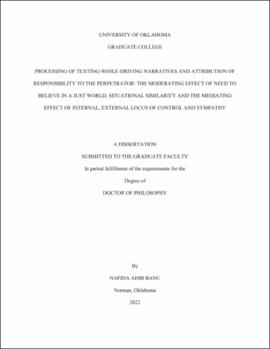| dc.description.abstract | Texting while driving is a dangerous form of distracted driving that causes injuries and fatalities every year. Combined efforts, such as legislation, enforcement, social norms, and education, were recommended to aware people about the consequences of texting while driving. However, there was insufficient research on how participants perceived the awareness campaign narratives describing the adverse effects of the drivers involved in texting-while-driving crashes. Thus, this study aimed to examine the texting-while-driving narrative campaigns on participants’ assignment of responsibility, punishment, attitudes, and driver traits to the responsible driver and behavioral intention not to text while driving. In addition, the study examined situational similarities between the participants and the perpetrator (and the victim) and the need to believe in a just world construct. The study employed a 2 (severity of outcome: severe vs. mild) x 2 (narrative types: endangering- self vs. endangering- others) x 2 (message replication) mixed factorial design. The severity of the outcome directly affected assigning punishment to the perpetrator, having negative attitudes toward the perpetrator and positive attitudes toward the victim. Endangering-others narratives directly affected assigning responsibility, punishment, less positive driver traits to the perpetrator, and having positive attitudes toward the victim. In the severe accident outcome, low situational similarities with the perpetrator decreased audiences’ behavioral intention to text while driving. The findings of this study will help design effective texting-while-driving campaigns. Theoretically, the findings of this study advance the application of defensive attribution theory (DAT), modified defensive attribution theory, the need to believe in a just world, and the rational decision stage model in a texting-while-driving scenario. | en_US |
